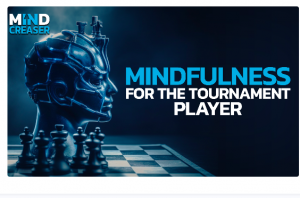As an adult chess improver with a longtime interest in Eastern spirituality, when I heard that a book called Mindful Chess was coming out, I was thrilled. Ok; I was thrilled once I got over the disappointment that someone had used a title that I had thought might fit the book that is gestating inside me. Now that I have read GM Paul van der Sterren’s Mindful Chess, though, I’m just delighted that he has given the chess community this readable account of his experience of two paths, that of chess and that of mindfulness. That is not all, however. At nearly the same time that Mindful Chess is being published, GM van der Sterren is also releasing In Black and White: The Chess Autobiography of a World Champion Candidate, the English translation of his 2011 Dutch autobiography. Both Mindful Chess and In Black and White have just been published by New in Chess. Amazon will have the autobiography at the end of February and Mindful Chess in mid-March. Ben Johnson has also just released a very in-depth interview of GM van der Sterren on the latest episode of his Perpetual Chess podcast. It’s a great time to learn about this fascinating member of the chess community.
Serendipitously, as I was reading Mindful Chess I learned that there was a mindfulness course consisting of video and audio tracks for chess players, created by Dr. Benjamin Portheault, a performance coach for mental athletes who specializes in chess. Mindfulness for the Tournament Player is built around the schedule of a chess tournament, with guided meditations for each stage of the event. A bonus feature helps you create a meditation based on one of your own best chess performances. I was especially moved by the lovingkindness mediations he includes in the section for after the tournament.
I’m really glad that mindfulness is becoming a part of the chess scene; if ever there was a pastime whose participants needed mindfulness, chess is it. I had been meditating daily for three years when I got into chess, but the 20-minute time slot that I had been using for meditation was soon more than usurped by my morning chess game and post-game analysis. I rationalized that chess required such intense concentration that it could replace meditation, which is true, to some extent. While I was working full time there wasn’t time for both in the morning, but I vowed to restart meditation once I retired, and that time has come. These resources–and the struggle I am having with how I feel after a chess loss–have convinced me to get my cushion out once again.
Mindful Chess is, fittingly, organized like a chess game, from setting up the pieces through the endgame. Each segment consists of a series of short essays in which van der Sterren talks about how he got into meditation toward the end of his career as a competitive chess player, while weaving in helpful explanations of the Buddhist concepts of impermanence, suffering, and no-self. He describes his first trying experience at a long meditation retreat, with insightful analysis of his pain points that I strongly recommend for anyone in a similar situation. After retiring from competitive chess, GM van der Sterren even taught meditation for a few years, but now his journey includes more chess than mindfulness. In addition to his discussions probing the Buddhist concepts mentioned above, his explanations of these evolutions make Mindful Chess a truly engaging read.
When you put down Mindful Chess, you will be eager to get started using mindfulness on your chess journey, and that is where Dr. Portheault’s course comes in. The two complement and reinforce each other so well, for example, where GM van der Sterren refers to waves of anger breaking on the rocks of mindfulness, Dr. Portheault refers to transforming the stormy sea in which we find ourselves after a loss into a realization that we were the calm ocean all along. Even if, like me, you have not yet been to a tournament, the meditations–especially the segments “Before the Game,” “After a Loss,” and “After a Win”–are easily adaptable to whenever you play your regular non-tournament games.
No one is claiming that adding mindfulness to your chess routine will increase your rating, but there is no doubt that it will make you able to weather a challenging journey with far more equanimity, especially with the aid of these two resources.









